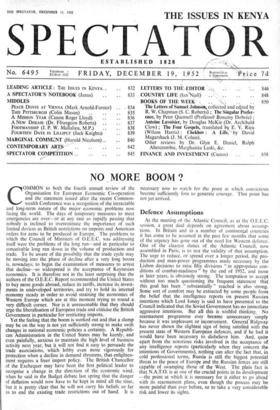NO MORE BOOM ?
COMMON to both the fourth annual review of the Organisation for European Economic Co-operation and the statement issued after the recent Common- wealth Conference was a recognition of the intractable and long-term nature of the major economic problems now facing the world. The days of temporary measures to meet emergencies are over—or at any rate so rapidly passing that nobody is inclined to 'overestimate the importance of such limited devices as British restrictions on imports and American orders for arms to be produced in Europe. The problems to which the Council of Ministers of O.E.E.C. was addressing itself were the problems of the long run—and in particular to conceivable long run down in the volume of production and trade. To be aware of the possibilty that the trade cycle may be moving into the phase of decline after a very long boom is, nowadays; to begin the examination of measures to arrest that decline—so widespread is the acceptance of Keynesian economics. It is therefore not in the least surprising that the authors of the O.E.E.C. Report recommended the United States to buy more goods abroad, reduce its tariffs, increase its invest- ments in undeveloped territories, and try to hold its internal economy steady in order to avoid straining the economies of Western Europe which are at this moment trying to round a very difficult corner. Nor is it unreasonable that they should urge the liberalisation of European trade and criticise the British Government in particular for restricting imports. Yet the feeling that the boom is worked out and that a slump may be on the way is not yet sufficiently strong to make swift changes in national economic policies a certainty. A Republi- can Administration in the United States may be keenly, and even painfully, anxious to maintain the high level of business activity next year, but it will not find it easy to persuade the trade associations, which lobby even more vigorously for protection when a decline in demand threatens, that enlighten- ment requires a freer import policy. The British Chancellor of the Exchequer may have been the first political leader to recognise a change in the direction of the economic wind, when he said in the Budget debate last spring that the danger of deflation would now have to be kept in mind all the time, but it is pretty clear that he will not carry his beliefs so far as to end the existing trade restrictions out of hand. It is necessary now to watch for the point at which convictions become sufficiently firm to generate courage. That point has not yet arrived.


































